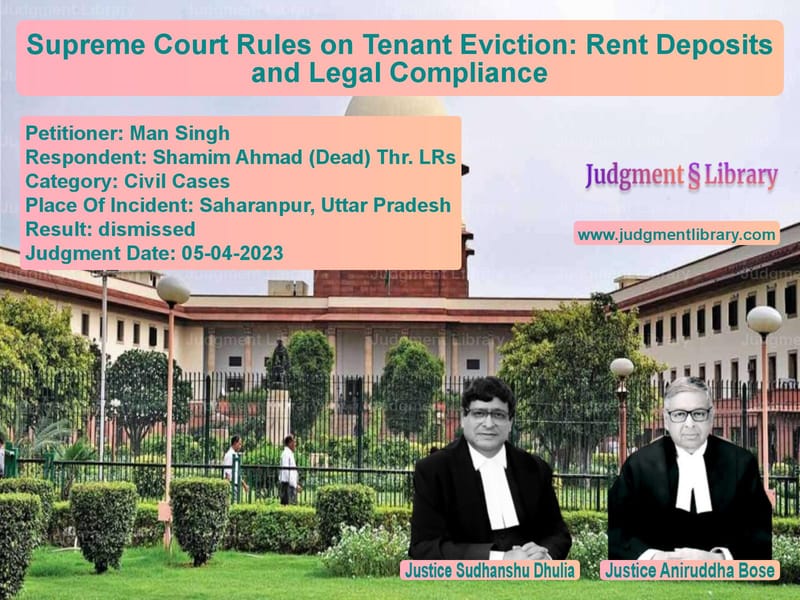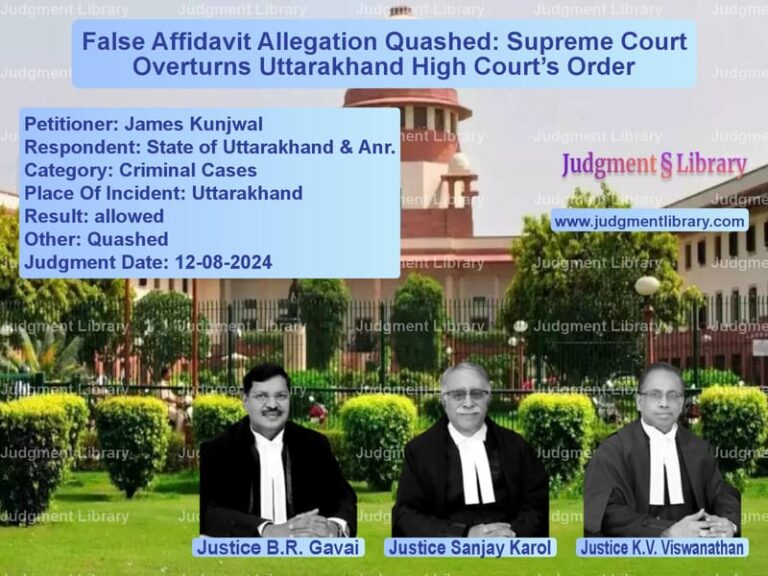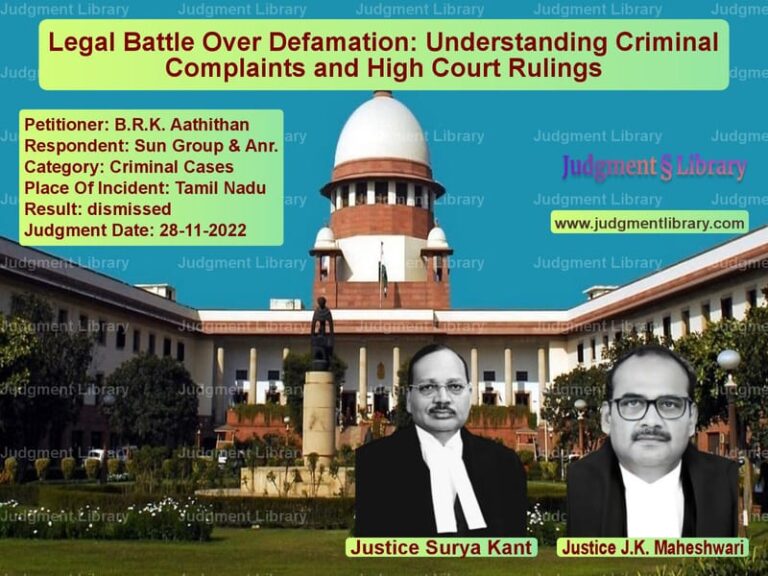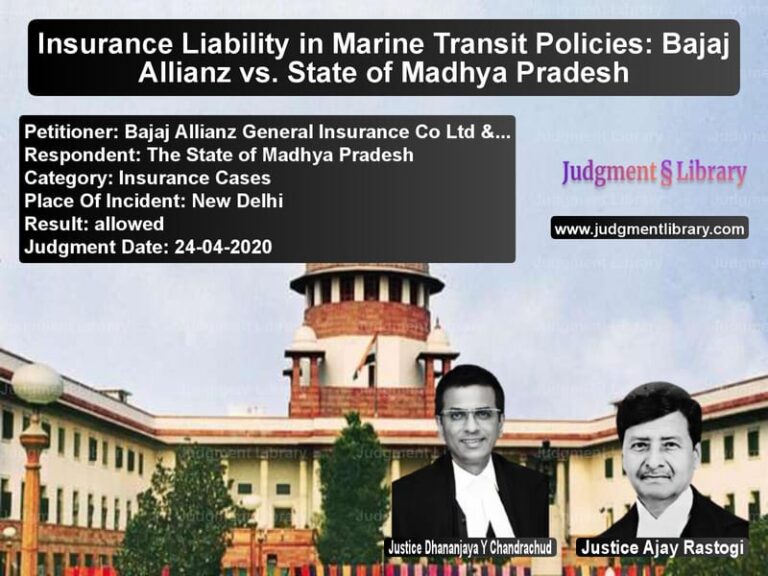Supreme Court Rules on Tenant Eviction: Rent Deposits and Legal Compliance
The Supreme Court of India, in the case of Man Singh v. Shamim Ahmad (Dead) Thr. LRs, ruled on a significant tenancy dispute involving non-payment of rent, eviction proceedings, and compliance with rent deposit laws. The ruling clarifies the obligations of tenants in depositing rent when the landlord refuses payment and the consequences of failing to meet statutory requirements.
Background of the Case
The case arose from a tenancy dispute over a shop in Kotla, Gangoh-Town, Saharanpur, Uttar Pradesh. The shop was rented to the appellant, Man Singh, on January 6, 1982, with an initial rent of Rs. 165 per month, which was later increased to Rs. 250 per month by January 1, 1990. The landlord, Shamim Ahmad, claimed that there was an agreement for annual rent increases, which the tenant disputed.
Key developments in the case:
- The landlord refused rent payments from June 1993.
- The tenant began depositing rent in court under Section 30 of the Uttar Pradesh Urban Buildings (Regulation of Letting, Rent, and Eviction) Act, 1972.
- On April 5, 1995, the landlord issued a notice of demand for rent arrears from May 1993 onwards.
- The tenant continued depositing rent in court but did not tender the rent to the landlord.
- The landlord filed an eviction suit under Section 20(2)(a) of the Act, alleging non-payment of rent.
- The tenant argued that he had always deposited rent in court and was not in default.
Petitioner’s Arguments
The appellant, Man Singh, contended:
- The landlord refused to accept rent, forcing him to deposit it in court under Section 30 of the Act.
- Since May 1993, he had continuously deposited rent in court and was not a defaulter.
- The landlord’s demand notice included an illegal rent increase beyond Rs. 250 per month.
- His deposits in court should be deemed valid payment of rent under the Act.
Respondent’s Arguments
The respondent’s legal heirs countered:
- Once the landlord issued a notice of demand, the tenant was obligated to pay rent directly.
- The deposit in court was invalid because the landlord had expressed willingness to accept rent.
- The tenant’s failure to pay rent within one month of the notice justified eviction.
- The trial court correctly held the tenant in arrears of rent and liable for eviction.
Key Legal Issues Considered
- Did the tenant’s court deposits satisfy rent payment obligations?
- Was the eviction valid under Section 20(2)(a) of the Act?
- Did the landlord’s demand notice override prior court deposits?
Supreme Court’s Observations
The Supreme Court ruled in favor of the landlord, stating:
- “Under Section 30, rent can only be deposited in court until the landlord expresses willingness to accept payment.”
- “Once the landlord issued a notice of demand on April 5, 1995, the tenant was required to tender rent directly.”
- “The tenant’s failure to pay within one month justified eviction under Section 20(2)(a).”
- “The trial court and revisional court correctly ruled that the tenant had defaulted in rent payment.”
The Court further upheld the Full Bench ruling in Gokaran Singh v. 1st Additional District and Sessions Judge, which stated:
- “If the landlord serves a formal notice of demand, the tenant must tender rent to the landlord and cannot continue depositing it in court.”
Final Judgment
The Supreme Court ruled:
“The appeal is dismissed. The tenant’s failure to tender rent to the landlord after receiving the demand notice constitutes default. The eviction decree is upheld.”
Impact of the Judgment
- Clarifies rent deposit laws – Court deposits do not override a landlord’s demand notice.
- Strengthens landlord rights – Tenants must comply with statutory rent payment obligations.
- Sets a precedent – Reinforces legal obligations in rent disputes under the UP Rent Control Act.
Conclusion
The Supreme Court’s ruling in Man Singh v. Shamim Ahmad clarifies that tenants cannot continue depositing rent in court after receiving a landlord’s demand notice. This decision strengthens rent laws and ensures that statutory compliance is maintained in tenancy agreements.
Petitioner Name: Man Singh.Respondent Name: Shamim Ahmad (Dead) Thr. LRs.Judgment By: Justice Sudhanshu Dhulia, Justice Aniruddha Bose.Place Of Incident: Saharanpur, Uttar Pradesh.Judgment Date: 05-04-2023.
Don’t miss out on the full details! Download the complete judgment in PDF format below and gain valuable insights instantly!
Download Judgment: man-singh-vs-shamim-ahmad-(dead)-supreme-court-of-india-judgment-dated-05-04-2023.pdf
Directly Download Judgment: Directly download this Judgment
See all petitions in Landlord-Tenant Disputes
See all petitions in Specific Performance
See all petitions in Damages and Compensation
See all petitions in Judgment by Sudhanshu Dhulia
See all petitions in Judgment by Aniruddha Bose
See all petitions in dismissed
See all petitions in supreme court of India judgments April 2023
See all petitions in 2023 judgments
See all posts in Civil Cases Category
See all allowed petitions in Civil Cases Category
See all Dismissed petitions in Civil Cases Category
See all partially allowed petitions in Civil Cases Category







